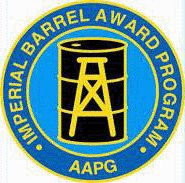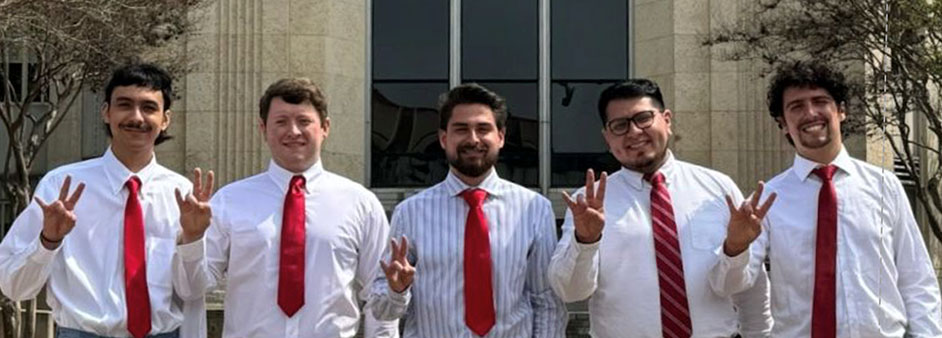UH Team Wins Third Place at the Imperial Barrel Award Global Finals on May 31
EAS Team was the Top Global Finalist in the Hydrocarbon Exploration Category
A team of five Ph.D. and M.S. graduate students from the University of Houston’s Department of Earth and Atmospheric Sciences won third place in the global finals of the Imperial Barrel Award Program (IBA) of the American Association of Petroleum Geologists (AAPG).

Team members are Michael Daniel (Ph.D., Team Captain), Daniel Maya (Ph.D.), Gabriel Lopez (M.S.), Edgar Moreno (M.S.). and Josh Miller (M.S.). Faculty advisors are Paul Mann and John Castagna, and industry advisors include Gary Guthrie (retired from Marathon) and Steve Walkinshaw (Vision Exploration).
The third-place global finals finish of the UH team was based on their analysis of a petroleum data set from Bristol Bay, Alaska. They received the Stoneley Medal that comes with a $5,000 cash prize for the AAPG student Wildcatters group.
In order to advance to the global finals, UH team won a North American semi-finals in an online competition with nine other teams held March 18.
The IBA Program is rigorous and contributes to AAPG’s mission of promoting petroleum geoscience training and advancing the careers of geoscience students. The program currently involves 58 teams and 295 participants. Teams are given three options for data sets to analyze: petroleum exploration, carbon capture, and geothermal energy. In this year’s global competition, UH was the top global finalist in the hydrocarbon exploration category.
In this annual competition, university teams analyze a dataset (geology, geophysics, land, production infrastructure, and other relevant materials) in the eight weeks prior to their local competition. Each team delivers their results in a 25-minute presentation to a panel of industry experts

The dataset the 2024 UH EAS team presented was the hydrocarbon potential Bristol Basin
along the southern margin of Alaska. The analysis also included plans for sequestering
CO2 resulting from the prospects along with geothermal power generation in this area
of active volcanoes.
For the competition, students have the chance to use state-of-the-art computer technology
and software on a real dataset, receive feedback from an industry panel of judges,
and win cash awards for their school. The judges select the winning team based on
the technical quality, clarity, and originality of the presentation.
In the world finals, the first place Imperial Barrel Award with its $20,000 cash prize went to the team representing Europe from UniLaSalle Institut Polytechnique (Beauvais, France) for their work on a geothermal dataset. The second place Selley Cup with its $10,000 case prize was awarded to the team from the University of Alberta (Edmonton, Canada) for their work on a carbon sequestration dataset.
An honorable mention teamwork award went to the team from Universidad Central de Venezuela in Caracas for their work on a petroleum dataset and an honorable mention technical innovation excellence award went to the team from Sultan Qaboos University in al-Seeb, Oman, for their work on a petroleum dataset.
Other teams that participated in the global competition on May 31 included University of Lagos, Nigeria (representing the Africa Region), Institut Teknologi Bandung, Indonesia (representing the Asia-Pacific region), Eotvos Lorand University in Budapest, Hungary (representing Eastern Europe) and King Fahd University of Petroleum and Minerals in Dharan, Saudi Arabia (representing the Middle East).
The co-chairs of the AAPG IBA Organizing Committee are Jensen Angelloz and Stefanie Hormaza Barcia. The eight volunteer judges for the combined petroleum/geothermal/carbon sequestration projects at the global competition were Diana Maria Duran (Occidental), Dr. Carlos Aizprua (Equinor), Heidi Hoffower (Chevron), Hamad Alghenaim (Saudi Aramco), Dr. Aubry DeReuil (Zanskar Geothermal & Minerals, Inc.), Dr. Chadwick Holmes (Chevron), Patrice Chauvin (Occidental), and Caroline Wachtman (Occidental).
When the IBA Program began in 2007, UH was one of the first schools to become involved in the new program and won the Gulf Coast Section that year. At that time, only a few schools were involved. Before 2012, this was the last time UH placed in the competition. UH won the global competition in 2017 and 2019.
For more information on IBA program, visit this webpage.
June 3, 2024